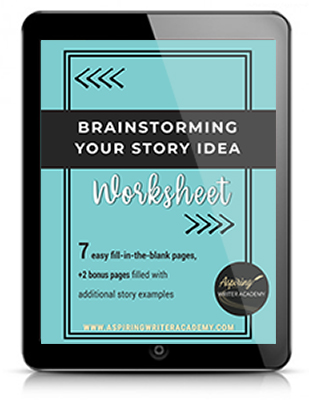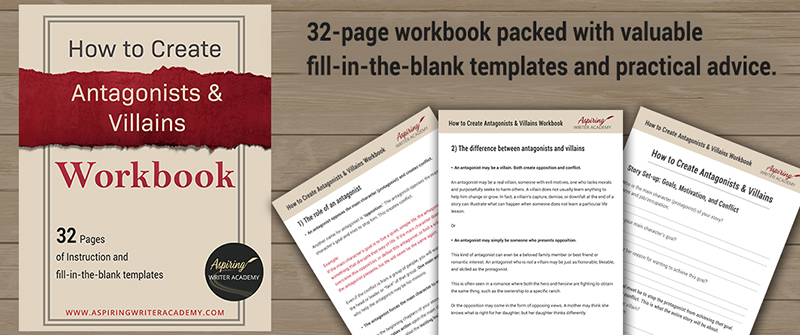How to Set New Year’s Resolutions for Fiction Writing

After the holiday season, the new year brings a chance for renewal and the opportunity to set new goals. While many of us establish New Year’s resolutions for various aspects of our lives, have you considered crafting resolutions specifically for your writing?
In How to Set New Year’s Resolutions for Fiction Writers, we provide a series of questions designed to help you create a writing plan that aligns with your objectives and keeps you motivated throughout the year.
In this post we will discuss:
- Brainstorming New Year’s Resolutions for Your Writing
- How to Set Yourself Up for Success and Actually Achieve Your New Year’s Resolutions
Brainstorming New Year’s Resolutions for Your Writing
Many writers take the week between Christmas and New Year’s to think about their goals for the upcoming year. This week is referred to as ‘slingshot week’ because the goal setting process will slingshot you from the current year into the next and give you a running start to tackle new goals with vigor.
While this can be done at any time of the year between projects, it is always good to start off the new year by looking back at what worked or didn’t work in the past and brainstorming new ideas to make changes in the future.
What do you want this year to look like? What would you like to accomplish?
What will you write this year? A short story, novella, or full-length novel? How many? What genre? Do you already have a story idea, or do you need to brainstorm a few?
Will you put together any book proposals? Will you research submission guidelines for traditional publishers? Which publishers or agents will you submit a proposal to?
How many books will you read this year? Reading keeps you sharp on current trends and sharpens your writing skills. How many fiction, non-fiction, or writing craft how-to books will you study?
Which online or in-person conferences will you attend this year? Which editors, agents, authors, bloggers, or other publishing professionals would you like to connect with this year?
What new skills do you need to learn or strengthen?
What new office supplies do you need to purchase or replace this year? A new computer or laptop or writing tablet? A new desk chair? Hard drive? Printer? Bulletin Board or wall calendar?
What new routines or daily habits will you adopt this year? Will you get up a half hour earlier to fit more writing into your schedule? Stay up half an hour later at night? Rearrange or cancel an activity to free up more time for writing?
What will you do to grow your author platform?
What new writing-related endeavors will you start this year? Will you create a website? A blog? A newsletter? A podcast? Turn your stories into Audio books? Create a new writing group? Or create an online social media reader-author group?
What marketing or promotional efforts will you pursue this year? How many book signings or author events will you do? Do you need new business cards or bookmarks, pens, swag, or promotional products?
Will you learn book formatting or how to self-publish? Or how to put together a book launch team?
Will you need to find a book cover designer or a virtual assistant?
Will you need to clean, reorganize, or redesign your writing office? Or perhaps turn an extra bedroom or closet into a writing station?
If needed, how will you take steps to de-stress or unclutter your life this year? What will you do to protect your physical and mental well-being?
How to Set Yourself Up for Success and Actually Achieve Your New Year’s Resolutions
Keep Your Goals Visible:
You need to actually write down your goals and keep them in a spot you are sure to view them every day. Writing down your goals helps make them real in your mind. Keeping them within eyesight reinforces your need to achieve them and helps keep you on track with daily motivation. It helps you remember why you set these goals and why they are important to you.
Look at Your Calendar:
This helps you to think about your goals realistically. Can you really achieve the goals you listed if you also plan to go on 4 big vacations this coming year, host guests over the summer at your own house, or accept a big volunteer position within the community? And all this in addition to taking care of and spending quality time with friends and family?
What if you get sick? Did you build in any buffer time for the unexpected? What if other opportunities arise that you hadn’t anticipated? Always allow extra time for ‘surprises’ in your schedule.
Considering these things, after taking an overall look at the upcoming year on your calendar, do you need to adjust some of your goals? Are some of your goals a little too ambitious? The key here is to set yourself up for success, not failure. Missing goals can be demoralizing. But accomplishing goals can boost your self confidence and motivate you to do amazing things!
Set S.M.A.R.T. Goals:
S = Specific goals. “I’m going to write a 30,000-word historical romance novella by June 30th.
M=Measurable goals. To write a 30,000-word novella in six months, you can see if you are on track to meet this goal by dividing the task into a goal of writing 5,000 words each month, which may also mean approximately 1,250 words per week. You can measure your progress.
A=Achievable goals. After looking at your calendar, is writing a 30,000-word novella by June 30th achievable? If the answer is yes, then this goal is potentially achievable.
R=Realistic (or Relevant) goals. Is writing this 30,000-word novella in six months realistic for you? Or are you a slow writer? Or are you going to be moving to a new location soon or going to need to recover from a medical diagnosis or go through physical therapy? Also, question whether this writing project is relevant or appropriate for you right now. Should you really be writing a novella or would a full-length novel be the wiser choice to grow your author platform? Should you really be writing comedy when you really want to be known for historical fiction?
T=Timebound goals. Your goals should have deadlines. A completion date. A definitive target to hit if you want to see success. Deadlines push you to go the extra mile and achieve your goals. If you miss a deadline on one goal, it will push back other deadlines for other goals. Take your deadlines seriously. When setting a deadline, be sure to build in some buffer time at the end. Also be sure to celebrate every time you meet a deadline or accomplish a goal! You earned it!
The Real Key to Achieving Your New Year’s Resolutions for Writing:
After you write down your S.M.A.R.T. yearly goals, you should break the list down into 6-month goals, 90-day goals, and monthly goals. This allows you to focus on priorities and breaking larger goals down into smaller goals helps make them more achievable.
Looking at your yearly list and their deadlines for completion, which goals do you need to work on during the first 6 months of the year? Which ones need the most focus right away?
Next, take those 6-month goals and break them down into 2 sets of 90-day goals. What has to happen or what do you need to do during the first 90 days?
Now look at those first 90 days (and also look at your calendar!) and break the tasks into monthly goals. What must you accomplish in January, the first month of the year, to keep you on track to achieve your larger goals by the end of the year?
Example: One of your goals is to write a book by the end of the following year, December 31st.
This goal will also include time for brainstorming/plotting, research, writing each chapter, editing & revisions, and then polishing.
During the first six months the focus will be on brainstorming/plotting, research, and writing at least half of the book’s chapters. (The second 6-month period will focus on finishing the chapters, editing & revisions, and polishing.)
Breaking the first 6-month period down further to 90-day goals, the first 90 days, the author can concentrate on Brainstorming/plotting, research, and perhaps write the first 3 chapters of the book.
The author can then break this goal down into monthly goals. During the first month (January), the author will focus on brainstorming/plotting the novel and gathering needed research. The author may choose to write one chapter each month in the 90-days or spend one month brainstorming, one month researching, and one month writing the first 3 chapters.
If the author chooses the second route, then to meet this goal of writing a book by year’s end, his goal for the month of January is to brainstorm/plot the novel. Deadline January 31st.
Do you see how breaking goals into smaller chunks makes them appear more achievable?
Too many authors think they have all year to write a book, and they can always do the hard work later or catch up later toward the end of the year, but when that later date comes, they realize they are in trouble and there’s no way they will accomplish the goal.
Be S.M.A.R.T. and set yourself up for success right from the beginning.
Accountability:
Who will keep you accountable this year?
Do you need a critique partner or critique group? Do you need to join a local or online writer group for networking and community?
Do you have a goal setting app on your phone, or do you need to get yourself a new yearly planner?
Do you have a goal chart where you can stick a checkmark, golden star, or smiley face for each day you worked on your goals or spent writing? It sounds silly, but our unconscious mind loves seeing those stickers mount up and soon you will push yourself so that you do not break the chain.
Will you give yourself little rewards for meeting each deadline? To celebrate the small wins? What would you secretly like to do or buy or receive for each goal accomplished?
If you get your family or friends onboard, they will start cheering you on so they can participate in the small wins too!
Example: Every month, if you achieve your writing goals, you will celebrate by taking your kids out for ice cream. Before long, they will happily respect your writing time so they can receive that treat and quality time with you on that special outing.
(I am not saying to ignore your family in order to write, but set boundaries on your writing time, be sure to include your family in your celebrations and rewards, and everyone will be happy.)
Remember—you can do this! Set goals, take action, keep yourself accountable, and celebrate each small win along the way.
Wishing you the best of success in the coming year!
We hope you have enjoyed How to Set New Year’s Resolutions for Fiction Writing and that you have gained some valuable tips to create a plan that helps you accomplish your writing goals during the coming year.
If you have any questions or would like to leave a comment below, we would love to hear from you!
Pin on Pinterest



If you like more help developing your story, you may wish to download our Free Brainstorming Your Story Idea Worksheet
Do you find it difficult to create compelling antagonists and villains for your stories? Do your villains feel cartoonish and unbelievable? Do they lack motivation or a specific game plan? Discover the secrets to crafting villains that will stick with your readers long after they finish your story, with our How to Create Antagonists & Villains Workbook.
This 32-page instructional workbook is packed with valuable fill-in-the-blank templates and practical advice to help you create memorable and effective antagonists and villains. Whether you're a seasoned writer or just starting out, this workbook will take your writing to the next level.
We Believe All Authors Can Aspire to Take Their Writing to the Next Level!
Our Goal for Aspiring Writer Academy is to help people learn how to write quality fiction, teach them to publish and promote their work, and to give them the necessary tools to pursue a writing career.

ENTER YOUR EMAIL BELOW
TO GET YOUR FREE
"Brainstorming Your Story Idea Worksheet"
7 easy fill-in-the-blank pages,
+ 2 bonus pages filled with additional story examples.
A valuable tool to develop story plots again and again.
Other Blog Posts You May Like
No More Excuses: How to Fit Writing into Your Life with Just 10 Minutes a Day
10 Questions to Consider Before Starting a New Writing Group
What is NaNoWriMo? How This Fun Challenge Can Kickstart Your Novel
100 Essential Writing and Publishing Terms All Authors Should Know
How to Get More Done with a Weekly Writing Plan!
How to Write Your Very First Fiction Novel
A Beginner’s Guide to the Top 10 Genres for Popular Fiction
How to Create a Deadline for Your Fictional Novel
Top 7 Books to Make You a Super-Productive Writer
How to Boost Your Productivity and Get Your Novel Written
How to Create S.M.A.R.T. Goals to Keep Your Writing on Track
How to Find a Writing Group: Tips for New Authors
Finding Your Genre: Tips for New Authors
The Power of Understanding Book Genres for New Authors
The Ultimate List of Book Genres: 95+ Popular Genres & Subgenres
Write Your First Novel: How Do You Start?
Do You Dream of Being a Published Author? (How Bad Do You Want It?)
Who is an ‘Aspiring Writer?’ 3 Tips to Escalate Your Career No Matter What Level You Are At
How to Write the Midpoint of Your Novel (and Avoid a ‘Saggy Middle’)
20 Items to Bring to Your First Writer’s Conference
How to Find a Great Story Idea in 4 Easy Steps
How to Write a Novel While Working Full Time
Slingshot Week: How to Set New Goals for Writing in 2023
The Pros and Cons of Writing Holiday Fiction (Collections & Anthologies)
Fiction Writing: How to Find a Critique Partner/Group
7 Steps to Begin Writing a New Fictional Story
Fiction Writing: 5 Key Differences Between a Novel and a Novella
Fiction Writing: Office Supplies to Help You Prepare to Write Your Next Novel
3 Levels of Goal Setting for Fiction Writers
50 Top Resource Books for Fiction Writers
Why We Started Aspiring Writer Academy: Our Story

is a multi-published author, speaker, and writing coach. She writes sweet contemporary, inspirational, and historical romance and loves teaching aspiring writers how to write quality fiction. Read her inspiring story of how she published her first book and launched a successful writing career.



























